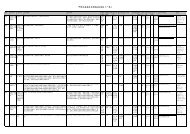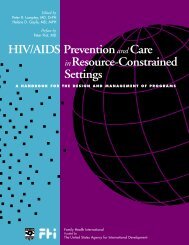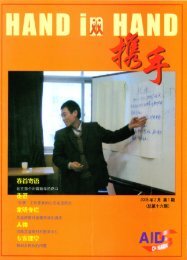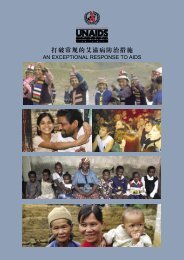The Training of Trainers Manual - UNFPA
The Training of Trainers Manual - UNFPA
The Training of Trainers Manual - UNFPA
You also want an ePaper? Increase the reach of your titles
YUMPU automatically turns print PDFs into web optimized ePapers that Google loves.
<strong>Training</strong> topic<br />
Techniques for building skills<br />
Objective <strong>of</strong> the session<br />
To help participants understand why skills-building is an essential component <strong>of</strong><br />
a health education programme. It provides an opportunity to explore the concept<br />
<strong>of</strong> life skills and to experience common techniques for building skills with young<br />
people.<br />
<strong>Training</strong> note<br />
Introduction<br />
Various studies have shown that knowledge alone does not lead to behaviour<br />
change. Most people know, for example, that cigarettes can cause lung cancer.<br />
But that does not necessarily keep them from starting to smoke or continuing<br />
the habit. In the same manner, being<br />
aware <strong>of</strong> how HIV and other STIs<br />
To adopt and practise safe sexual<br />
behaviour, young people need to develop<br />
important life or behavioural skills, such as:<br />
▼ Self-awareness<br />
▼ Decision-making skills<br />
▼ Assertiveness (for example, to be able to<br />
resist pressure to use drugs or to have sex)<br />
▼ Negotiating skills (to insist upon<br />
protected sex)<br />
▼ Practical skills (for efficient condom use)<br />
▼ Recognizing, avoiding, or managing situations<br />
that may lead to violence or abuse<br />
are transmitted or knowing how to<br />
protect oneself does not always lead<br />
to safer behaviour. So, activities that<br />
only impart information should not<br />
dominate a training programme.<br />
Knowledge is only a base upon which<br />
to build positive skills, attitudes,<br />
and values.<br />
Word sense<br />
Life skills are abilities for<br />
adaptive and positive behaviour<br />
that enable individuals to deal<br />
effectively with the demands and<br />
challenges <strong>of</strong> everyday life.<br />
72 <strong>Training</strong> <strong>of</strong> <strong>Trainers</strong> <strong>Manual</strong>

















